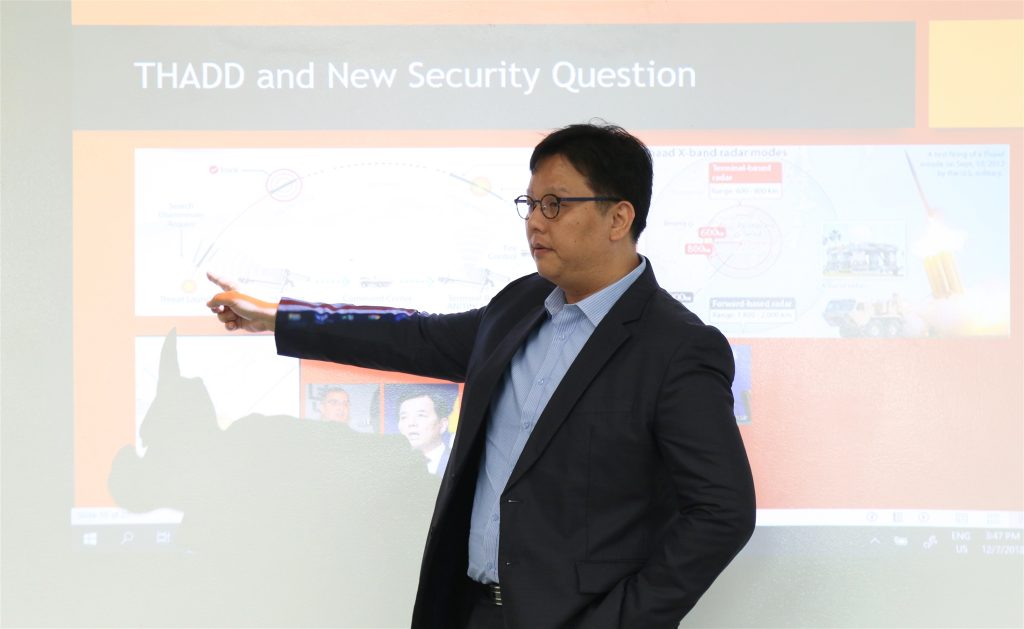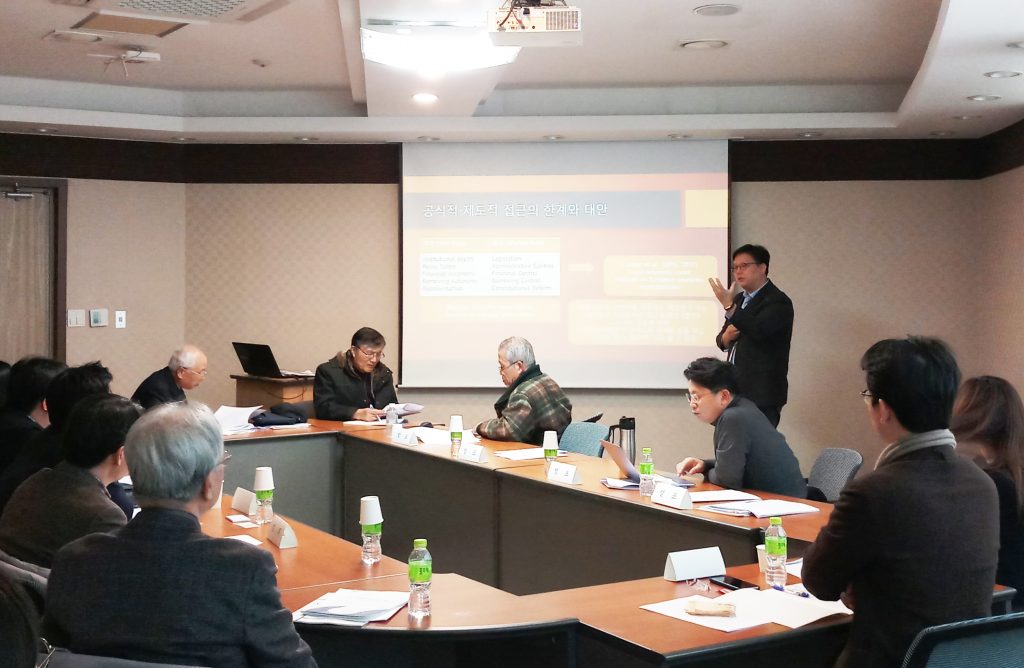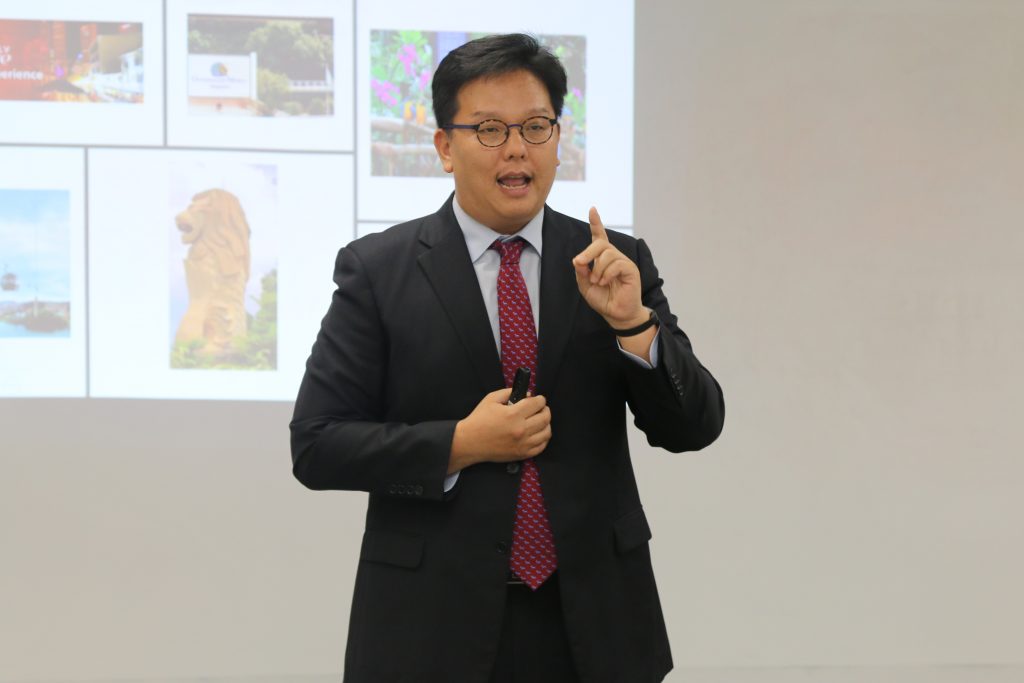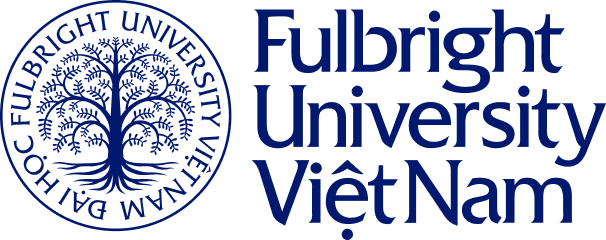
In June 2019, Master of Public Policy (MPP) Graduate of 2019 Phan My Dung and Dr. Bae Yooil attended a seminar in Korea on the topic of public governance. Together, student and professor introduced their research findings on young Vietnamese career choice motivation between the public and private sectors, a deep look into the millennial workforce in Vietnam’s emerging economy.
What originally began as Phan My Dung’s MPP Master’s thesis under the direct guidance of Dr. Bae Yooil eventually earned the first prize for the best Master Thesis of MPP 2019 and will soon be published in an academic journal. The work was appreciated as a quality contribution to research, and for its practical applications for the policymaking community in Vietnam: if young Vietnamese graduates overwhelmingly choose to work in the private sector, what are the implications for governmental workforce replacement?
Through a fruitful collaboration between professor and student, the scope of the research was expanded, destined not only for internal dissemination within the Fulbright community, but also for a broader distribution through the extended academic network of Dr. Bae Yooil, and finally presented at a policy research seminar in Korea
Phan My Dung recalled how anxious she felt on the trip as she had to present her findings in English. She was afraid that her command of the language would not reach the standards expected by her Korean and international policy research peers. But Dr. Bae Yooil’s encouraging words, his continued assurances so she may remain confident, and his determination to see her complete her task left a vivid impression on the newly minted researcher.
“After the lecture, I came to thank him. He just hugged me and said: ‘I see you as family’. He told me how much he recognized my efforts, ” shared Phan My Dung.
Mentoring a New Generation
Dr. Bae Yooil has worked at The Fulbright School of Public Policy and Management (FSPPM) for the past two years as a senior lecturer, researching and teaching comparative politics, public policy, public management, urban and local political economies, and international development assistance. The professor joined the FSPPM faculty at a critical juncture, just as the school transitioned from the Fulbright Economics Teaching Program (FETP), under the University of Economics and with the cooperation of Harvard Kennedy School, to become its own academic institution, Fulbright University Vietnam.
After 10 years working with the Lee Kuan Yew School of Public Policy as a Postdoctoral Fellow, and at Singapore Management University as an Assistant Professor, Dr. Bae had decided to further his academic career in a deeply international environment. Leveraging his strong academic background, Dr. Bae had set his sights on public policy education institutions in developed countries, interviewing for posts in multiple European countries, including the UK and Finland, in Hong Kong, and Korea. Dr. Bae only applied to one university in a developing country: FSPPM, Vietnam.
An interview with Dr. Vu Thanh Tu Anh at the end of 2017, then Dean of FSPPM, convinced him to seriously consider joining the faculty. For Dr. Bae, it quickly became evident FSPPM was shaping to become a strong player in the field of regional public policy analysis through a combination of a unique historical background, academic heritage, and bold vision.
“The school already had a strong legacy in FETP. Dr. Vu Thanh Tu Anh shared his ambition to build up public policy programming in Vietnam, nurturing this institution to be a leading research and education institution at the center of economic development and modernization. I believe this is true. Together with other FSPPM faculty, we can nurture students for the future of Vietnamese society and governance,” recalls Dr. Bae.
As Dr. Bae explains, public policy schools are currently experiencing fast growth around the globe. Policy programs in Asia in particular are garnering much attention, with fast growing schools such as Lee Kuan Yew School of Public Policy, KDI e-Globe Institute in Korea, or the Public Administration Program at Tsinghua University.
But FSPPM possesses some unique advantages. On an interpersonal level, Dr. Bae Yooil describes a tight-knit community of students and researchers, current graduates and alumni that share a common enthusiasm for new knowledge, conducive to academic collaboration. FSPPM faculty are also determined to guide and closely advise student research, while the varied profiles of FSPPM students provide a trove of practical insights and experiences to better serve policymakers at every level, whether in the public or private sector, from local authorities to the central government.
On an institutional level, FSPPM is uniquely positioned to fulfill its ambitions as a regional hub of policy research. “FSPPM is celebrated as the best policy hub in Vietnam, and our links with global and regional organizations are quickly growing,” says Dr. Bae Yooil.

Building on Global Research
Dr. Bae Yooil first discovered Vietnam with his family in 2015, when a sense of kinship was impressed upon him by cultural elements familiar to his Korean sensibilities. But Dr. Bae’s eye for public policy also saw a strong potential for development in a country placed at a synergistic juncture of Eastern and Western influences.
As the professor explains, public policy research is crucial to Vietnam’s development, harnessing other countries’ experiences to limit pitfalls – or avoid them entirely. If properly adapted to Vietnam’s unique social, political, and economic landscape, developed countries hold valuable lessons that can help Vietnam keep its rapid, sustained pace of development. According to him, one of the biggest misconceptions in development research is to try and impose “recipes” from one country to another.
“Strategies that were successfully applied in developed countries are unlikely to bring about the same effect in Vietnam. In fact, each development stage of a country has its own characteristics and is governed by countless different factors and variables,” emphasizes Dr. Bae Yooil. This is why FSPPM plays a crucial role. As Vietnam’s foremost policy research center, the institution has much to offer, namely research and practical experience in public policy, public management and economics based on global knowledge, rethought for the local context.

As a foreign lecturer at FSPPM, Dr. Bae said one of the biggest challenges for him is socio-cultural differences. After a lecture on cultivating creativity and innovation in business, he received feedback from students that although the lesson was very good, those concepts were difficult to apply in workplaces in Vietnam. At that time, the professor likened how ideas change the world to falling snow: “If one snowflake falls, it melts. But repeat the process enough times and there is an inflection point where suddenly the entire landscape changes. In the beginning, your changed attitude in your organization doesn’t make any big change, but if you continue, your neighbors and co-workers will be influenced by what you practice. In the end, your organization’s entire culture gets changed. That’s the power of an idea.”
In the classroom, Dr. Bae Yooil often explores innovative teaching methods. When he realized that students needed to build their skills in conveying their message to the public, he developed a presentation format based on press conferences. Students were assigned to produce a 4 to 7-minute video presenting a given topic as if they were conducting a real press conference and post it on YouTube. Recently, Dr. Bae Yooil also started to introduce design thinking principles, placing participants in the shoes of their study subject to observe and handle situations.
At FSPPM, graduates come from many different fields and careers, sometimes with very different personal opinions. This contributes to a diverse learning experience, giving students the opportunity to exchange and see from new perspectives. To balance the flow of opinions in a group is not easy, especially with seasoned professionals, but Dr. Bae Yooil hopes the experience will assist the students in becoming wise leaders, developing their ability to assess problems from many angles, whether in the public or private sectors.
“If everyone really has completely different experiences and practices, I think academic institutions cannot play their role. Yes, we should try to reconcile differences and accept diversity, but at the same time we must acknowledge and understand historically proven, factual truths. We are living based on the accumulated experiences of our ancestors. That means we have to sort through information, even if seemingly contradictory, to find the common patterns.”
This does not imply that this accumulated knowledge should be taken at face value. Indeed, the professor always exhorts his students to think critically, no matter how authoritative the source seems, always reaching for both better factual understanding and better modelling. This is similar to his approach to international development: development theories from America and Europe were lionized while their countries of origins experienced unprecedented growth in the 1950-60s. But they did not necessarily correlate with success in the countries that subsequently adopted them. Dr. Bae emphasizes nothing should be taken at face value.

“When I teach development policy, I introduce students to development models of several countries, and then we discuss what were effective policies and how the country can develop from there – everything from public services to infrastructure. With specific issues such as urbanization, public health or public welfare, I always ask questions such as ‘what’s the challenge here?’, ‘what can we do to deal with it?’… My principle is that we shouldn’t be afraid of the big names, like Elinor Ostrom, or Robert Putnam for example. I am a supporter of Karl Popper’s philosophy that there is no perfect theory, only theory closer to the truth. That is why I often encourage students to ask ‘why’ questions and never believe too much in a certain opinion. Just never stop questioning,” Dr. Bae Yooil commented.
Nguyen Thi Xuan Huong, a former student of the Master of Public Policy (MPP) course of 2020, shared that Dr. Bae Yooil’s teaching style helped her form necessary comparative thinking skills. For example, regarding gaps in the management of land use rights in Vietnam, participants have to answer a series of questions such as ‘Do other countries have a similar problem? ‘,’How have they solved them? ‘, or ‘What can we learn from those solutions, and how can we apply them to domestic problems?
“Professor Bae Yooil would lead us through the steps, thinking through difficult problems so we can find our own solutions. His strict standards have made my graduate research more professional and comprehensive. But what I treasure and admire the most about him is his kindness, patience and tolerance,” confided Xuan Huong.
Do Minh Tam, enrolled in MPP2021, shared that Dr. Bae Yooil’s classes help her not only gain theoretical knowledge, but also form the ability to see the problem from a multi-dimensional, and multi-level perspective. Thanks to selected, regularly updated case studies “localized” to suit the Vietnamese context, she gained a deeper understanding of the development problems facing the country.
“Dr.Bae always brings to class a professional demeanor and carefully prepared lesson plans. Even in the face of the COVID-19 crisis, his Public Management class went smoothly both online and offline because he always tries his best, redoubling in effort to deliver quality lectures. Whenever I need help, he always answers in detail, opening up deeper avenues of analysis,” said Minh Tam.








